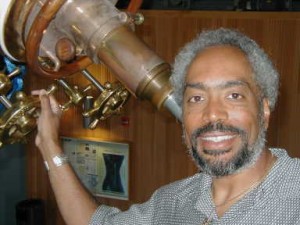
This week’s open thread will highlight African-American Astronomers and Astrophysicists.
Gibor Basri is an American astrophysicist, born in New York on May 3, 1951.
The son of Phyllis Basri, a professor of dance and ballet, and Saul Basri, professor of physics at the University of Colorado, Basri grew up in Fort Collins, Colorado, together with his younger brother David. The family lived for brief periods in Burma (1957) and Sri Lanka (1965).
Basri graduated in physics at Stanford University in 1973, and received his Ph.D. in astrophysics at the University of Colorado in 1979. His thesis, under the supervision of Jeffrey Linsky, was on stellar activity, based on observations by the International Ultraviolet Explorer (IUE) satellite, of which he was one of the first users. A postdoctoral award took him to the U.C. Berkeley astronomy department where he has been a professor since 1994. His work there originally focused on high-energy observations of stars (with Stuart Bowyer). In the last decade he turned to studies of star formation (with Len Kuhi). Basri’s most noteworthy work includes a 1980 study of T Tauri-type stars, and he is recognized as a world expert on brown dwarf stars. He is one of the most published African-American astronomers.
In 2011, as vice chancellor for equity and inclusion for the U.C. Berkeley campus, he served as a communicator between the university administration and students supporting the Occupy movement.
Harvey Washington Banks was born on February 7, 1923, in Atlantic City, NJ to Nettie Lee Jackson and Harvey Banks, Sr. At a very young age, he moved to Washington, DC, where he later attended Dunbar High School. Banks was the first African-American to receive a Ph.D in Astronomy.
He attended Howard University, where he earned a BS in physics in 1946 followed by an MS in physics, in 1948. After receiving his degree, Banks stayed at Howard as a a research associate in physics. In 1952, he accepted a job in the private sector as an electronic engineer at National Electronics, Inc. After two years working in industry, he began teaching physics and mathematics in the public school system of Washington, D.C. He spent the same amount of time teaching before returning to school, himself.
He worked as a research assistant in astronomy at the Georgetown College Observatory while working on his doctorate at Georgetown University. He completed his dissertation on planetary spectroscopy, titled “The First Spectrum of Titanium From 6000 to 3000 Angstroms,” involving the properties of light originating from distant sources. In 1961 he became the first African American to receive a Ph.D. in astronomy.
After another year at Georgetown, as a fellow, he became a lecturer and research associate at Georgetown while also teaching at the American University and at Delaware State College. In 1967, he was appointed as a professor of astronomy and mathematics at Delaware State, where he was also made director of the college’s observatory. He remained in those posts until September 1, 1969, when he returned to Howard as an associate professor of astronomy. In 1971 the university added an appointment as an associate professor of physics. He remained in that position until his death.
His research interests included determination of orbits, celestial mechanics, high dispersion spectroscopy, and the geodetic determinations from the observations of solar eclipse and satellites. In the 1970’s Harvey Washington Banks was a member of the Beltsville Project and supervised the construction of an observatory outside Washington, DC. He also coordinated the Astronomy and Space Seminar for the National Science Teachers’ Association.
Dr. Banks married Ernestine Boykin. The couple had four children-Harvey III, Deborah, Dwann, and Darryle. He died in 1979.

